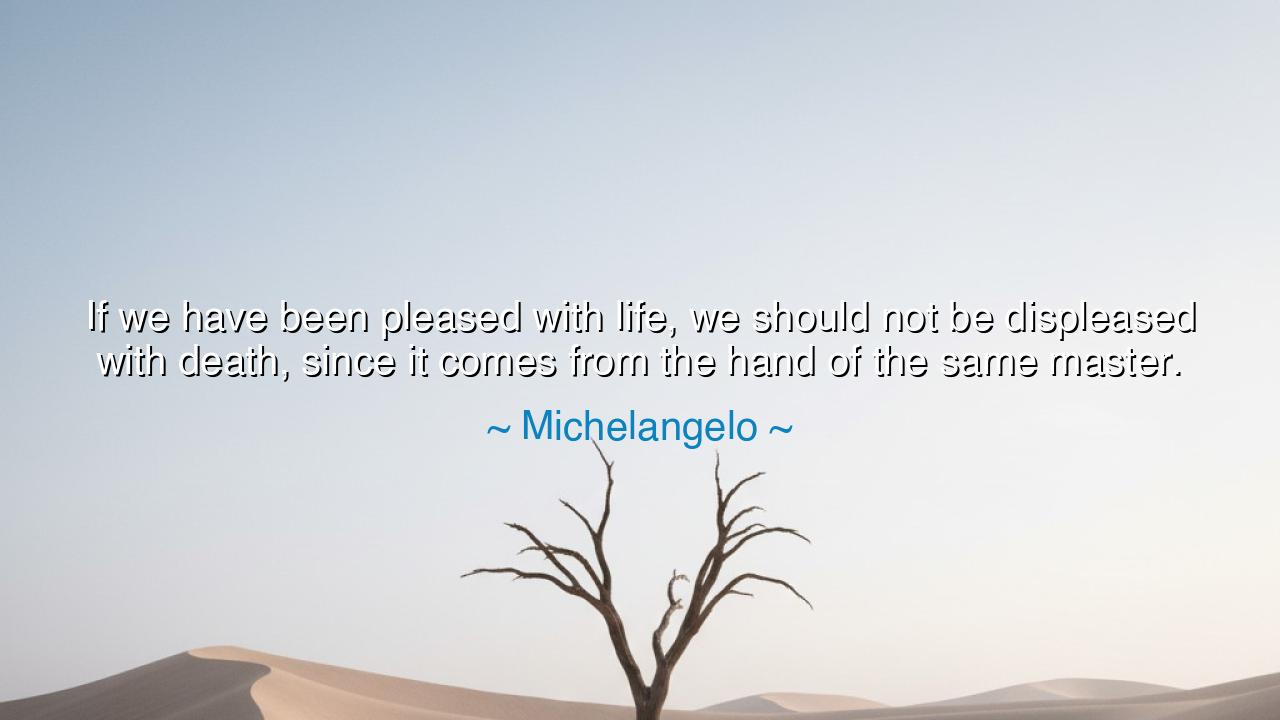
If we have been pleased with life, we should not be displeased
If we have been pleased with life, we should not be displeased with death, since it comes from the hand of the same master.






“If we have been pleased with life, we should not be displeased with death, since it comes from the hand of the same master.” So spoke Michelangelo Buonarroti, the sculptor of gods, the painter of creation, and the poet of the soul. In this single sentence, he revealed a wisdom carved not only from marble, but from the deep stone of the human spirit. His words are not those of despair, but of reconciliation — a man’s acceptance of the great rhythm that governs all things. To love life and to hate death is to love the seed but curse the soil that bore it. Michelangelo, who shaped beauty from stone, understood that the same hand that grants us breath also stills it, and both acts are sacred.
The origin of this quote lies in the twilight of the master’s life. Having painted the Last Judgment and sculpted the Pietà, Michelangelo had spent decades staring into both beauty and mortality. His art was a dialogue between flesh and eternity, between the glory of life and the silence that follows it. In his final years, when his body grew frail and his spirit turned inward, he came to see that death was not an enemy, but the final brushstroke of the divine artist — the closing note in the music of existence. As his hands, once steady upon the chisel, began to tremble, he accepted that the same Creator who gave him the gift of form would one day reclaim it.
To the ancients, this truth was known well. The Stoic philosophers of Rome — Seneca, Marcus Aurelius, and their kin — spoke often of the unity between life and death. They taught that both spring from the same source and must be received with equal grace. Marcus wrote, “Accept the things to which fate binds you,” for to resist them is to war against the nature that made you. Michelangelo, though born a millennium later, spoke in the same spirit. He knew that the sculptor who strikes the marble does not destroy it but reveals its form. So too, the Master of life shapes the human soul through time, love, and loss — and when the final blow falls, it is not ruin but completion.
There is a story told of Socrates, who, condemned to death, drank the hemlock calmly among his friends. When they wept, he smiled and said that death was but a journey — a passing from one state to another, as natural as sleep. Like Michelangelo, he saw no cruelty in the hand of fate, only mystery. And so, he met the end as a philosopher should: in peace, as one who trusts the order of the universe. Their teachings converge across the centuries, reminding us that fear of death is born not from nature, but from ignorance — the failure to see that life and death are one continuous act of creation.
Michelangelo’s faith was not blind; it was forged through labor, solitude, and sorrow. He had seen empires rise and fall, friends die, and beauty decay. He had wrestled with God in paint and stone. Yet, even amid this turmoil, he could still speak with serenity: that if we have been pleased with life, if we have marveled at the sun, the laughter of friends, and the wonder of the human form, we should not recoil when the same divine hand reaches out to close our eyes. For both joy and departure flow from the same fountain — the fountain of being.
This wisdom is not resignation but liberation. To see death as divine is to be free from fear, and to be free from fear is to live more fully. The one who dreads the end cannot savor the present; he clings to each moment like a miser, hoarding breath instead of using it. But the one who accepts the unity of all things lives with courage, with generosity, and with awe. He walks through life as a guest at a sacred feast, grateful for every cup of wine, knowing that the host will one day call him home.
The lesson, then, is clear and eternal: trust the master who made you. Do not curse the dusk if you have rejoiced in the dawn. Live with such depth and grace that when the final summons comes, you will greet it not with terror but with quiet reverence. Speak your truths, love your people, create your art, and when the time comes to lay down your tools, do so with peace in your heart. For the one who shaped you in life does not abandon you in death — He merely calls you into another form, another beauty, another beginning.
Thus, remember the words of Michelangelo, the servant of beauty and the student of eternity: if life has been a gift, then death, too, must be a grace. Do not fear the sculptor’s hand — for every blow that falls upon the marble of existence reveals, at last, the masterpiece within.






AAdministratorAdministrator
Welcome, honored guests. Please leave a comment, we will respond soon